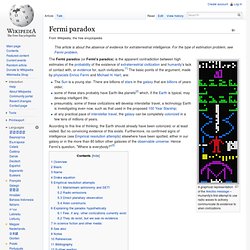

Fermi paradox. A graphical representation of the Arecibo message – Humanity's first attempt to use radio waves to actively communicate its existence to alien civilizations The Fermi paradox (or Fermi's paradox) is the apparent contradiction between high estimates of the probability of the existence of extraterrestrial civilization and humanity's lack of contact with, or evidence for, such civilizations.[1] The basic points of the argument, made by physicists Enrico Fermi and Michael H.

Hart, are: The Sun is a young star.
September 2010. Infinite monkey theorem. The infinite monkey theorem states that a monkey hitting keys at random on a typewriter keyboard for an infinite amount of time will almost surely type a given text, such as the complete works of William Shakespeare. In this context, "almost surely" is a mathematical term with a precise meaning, and the "monkey" is not an actual monkey, but a metaphor for an abstract device that produces an endless random sequence of letters and symbols.
One of the earliest instances of the use of the "monkey metaphor" is that of French mathematician Émile Borel in 1913,[1] but the earliest instance may be even earlier. The relevance of the theorem is questionable—the probability of a universe full of monkeys typing a complete work such as Shakespeare's Hamlet is so tiny that the chance of it occurring during a period of time hundreds of thousands of orders of magnitude longer than the age of the universe is extremely low (but technically not zero).
Solution[edit]